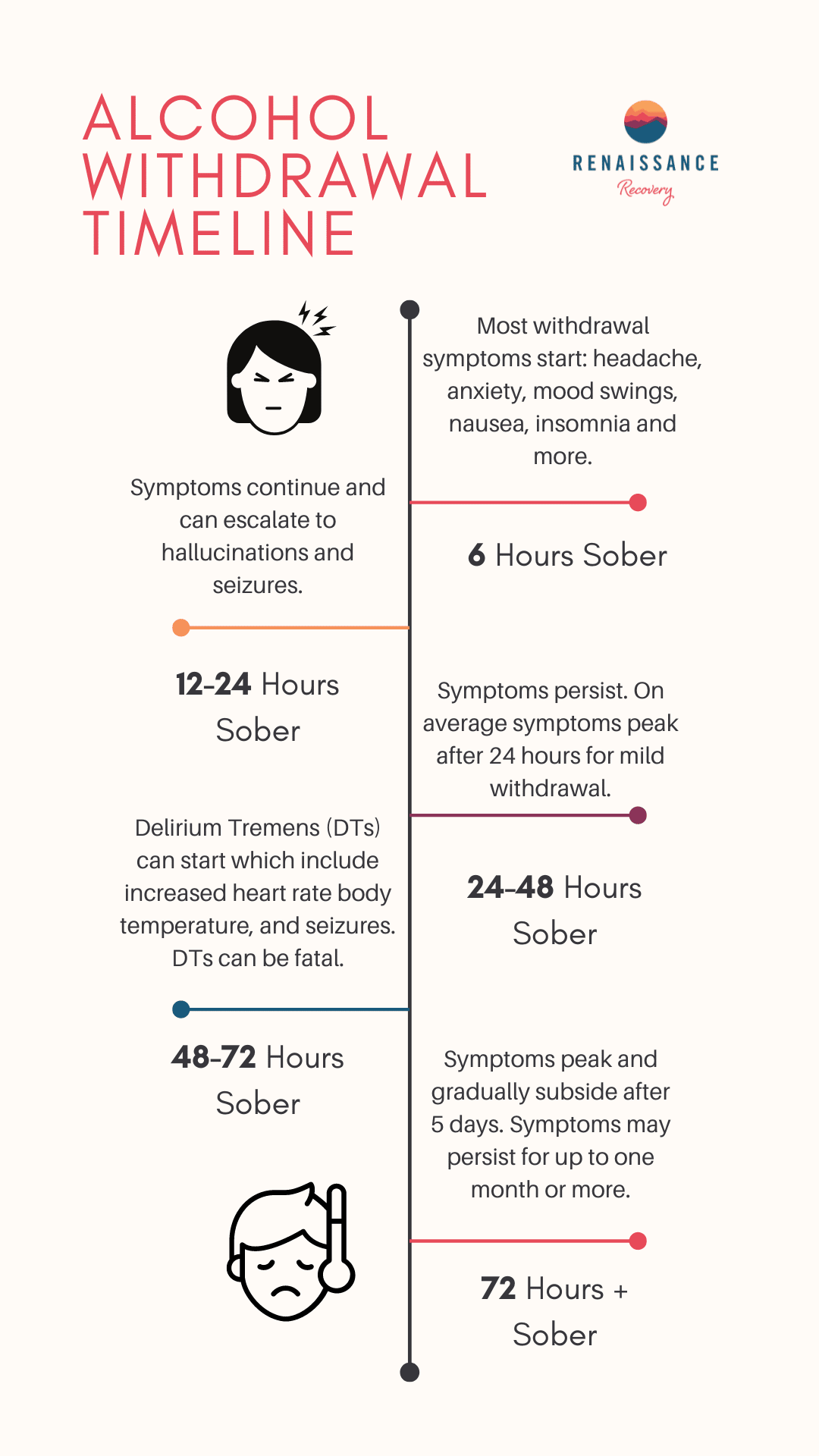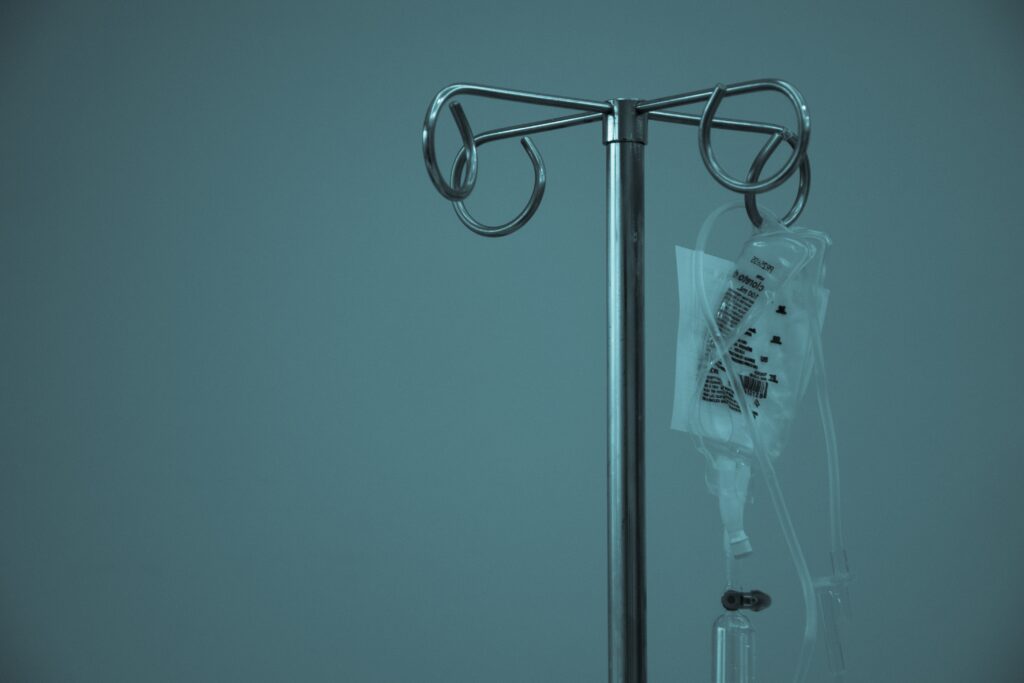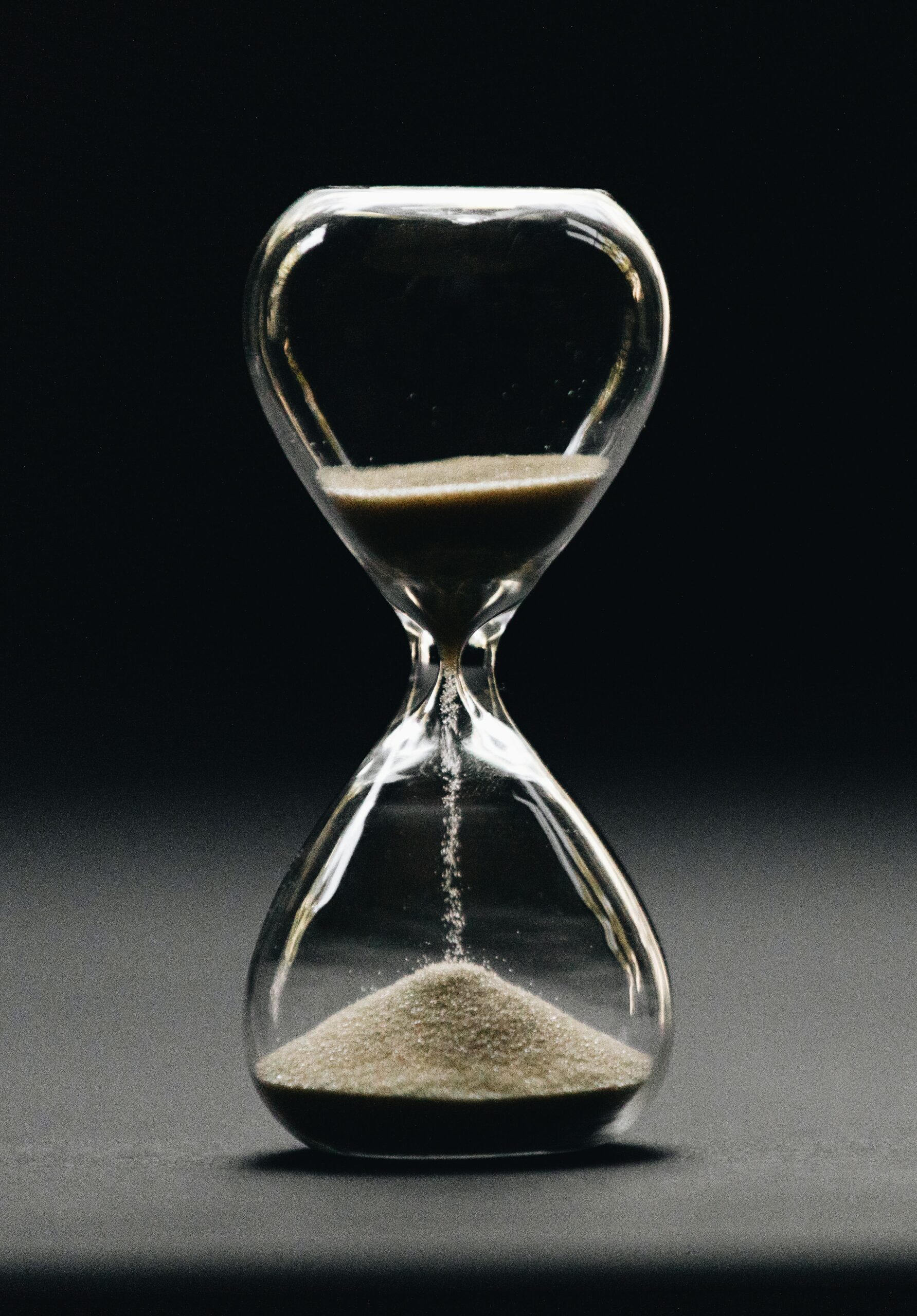Alcohol Withdrawal & Detox
Addiction Treatment for Alcoholism
With over 240 million people suffering from alcohol use disorder, alcohol withdrawal is a common struggle that people face when trying to get sober.
If you or a loved one are struggling with alcohol use disorder, you might have reached the stage where you’re considering alcohol rehab. Read on to learn more about alcohol withdrawal and how getting treatment in a professional facility can help get you sober, and possibly save your life when withdrawal symptoms become intense.


By: Renaissance Recovery
Clinically Reviewed by: Diana Vo, LMFT
Last Updated:
02/29/2024
What is Alcohol Withdrawal?
If you are wondering about the timeline for alcohol withdrawal, here are some symptoms you can expect.
AWS (alcohol withdrawal syndrome) refers to the physical and emotional withdrawal symptoms that present when a heavy drinker moderates or discontinues the use of alcohol.
When Does Alcohol Withdrawal Start?
How long before alcohol withdrawal starts depends on the timing of your last drink. Alcohol withdrawal symptoms will begin around 6-12 hours after the last drink, although they most often occur within 24-48 hours after the last drink.
The severity and timeline of withdrawal symptoms can vary depending on things like:
Amount and duration of alcohol consumption
Age
Overall health
And previous experiences with alcohol withdrawal

Alcohol Withdrawal Symptoms
Mild AWS is characterized by these symptoms:
Anxiety
Fatigue
Nausea
Vomiting
Those who experience severe AWS may experience:
Hallucinations
Life-threatening seizures
- Delirium tremens
Why do withdrawal symptoms manifest during alcohol detox, though?
Well, the sustained consumption of alcohol typically triggers lasting changes to the CNS (central nervous system).
As a CNS depressant, alcohol has a sedative effect in the brain. Chronic or heavy drinking exposes you continuously to these depressant effects. Your brain will respond by producing chemicals to mitigate this imbalance, counteracting the sluggish feeling that episodes of heavy drinking can induce.
Consuming alcohol regularly will cause your brain to produce higher levels of the neurotransmitters – chemical messengers – norepinephrine and serotonin. If you eliminate alcohol, your brain becomes overstimulated. Alcohol withdrawal symptoms are a physical and emotional response to this temporary imbalance.
The alcohol withdrawal symptoms timeline present over three distinct stages:

3 Stages of Alcohol Withdrawal Syndrome
While there is a typical symptoms of alcohol withdrawal timeline for most people, the stages of alcohol withdrawal can vary based on each person’s:
- Individual health status
- Duration of alcohol abuse
- & Amount of alcohol regularly ingested
Howeve, the general alcohol withdrawal symptoms timeline present over three distinct stages:
It’s important to note that moderate to severe dependence on alcohol can result in life-threatening withdrawal symptoms like seizures, heart failure, infections, trouble breathing, and more.
It’s extremely important that you or a loved one seek treatment for alcohol withdrawals at a professional medical detox center, and do not attempt to withdraw from alcohol at home.

Find Alcohol Detox Today
Get evidence-based treatment to overcome alcohol addiction at Renaissance Recovery. Call our team now to learn more about the process and let us help you find a detox program.

Alcohol Withdrawal Symptoms Timeline
These are the symptoms of alcohol withdrawal you can expect to encounter during the three stages of alcohol withdrawal outlined above:
Mild AWS: Symptoms include headaches, GI disturbances, anxiety, insomnia, and heart palpitations.
Moderate AWS: Mild hyperthermia, raised heart rate, confusion, abnormal breathing, and high blood pressure, in addition to the symptoms of mild AWS. The alcohol withdrawal seizures can begin at this stage.
Severe AWS: Some of the more severe symptoms of AWS include disorientation, attention issues, hallucinations, seizures, and the symptoms of mild and moderate AWS.
The duration and quantity of alcohol directly impacts the alcohol detox timeline and withdrawal timeline. Any underpinning physical or mental health conditions will also influence how long alcohol withdrawal lasts.
Although all cases of alcohol detox are unique, the following timeline is indicative of what to expect during withdrawal detox timeline. Alcohol detox is a difficult and complex process and is always best to navigate with in a professional substance abuse treatment center environment, as dangerous symptoms like heart palpitations alcohol withdrawal can occur.
The Timeline for Alcohol Withdrawal
The timeline for alcohol withdrawal can vary based on several factors like length and quantity of alcohol abuse, however there is a standard alcohol detox symptoms for most.
An inpatient rehab center can provide safe, effective treatment for all stages of alcohol withdrawal, as well as set you or a loved one up with the roadmap for ongoing care and long-term sobriety.
The detox from alcohol includes the following phases:
How Long Does it Take for Your Body to Return to Normal After Alcohol?
While there is no fixed blueprint for alcohol detox and withdrawal, most case of AWS involve symptoms that subside after no more than five days.
In the event of PAWS (post-acute withdrawal syndrome), symptoms can sometimes persist for a month or more, although the alcohol detox symptoms can differ for everyone.
Source
What Is Alcohol Detox?
It is important to understand what alcohol detox is and what to expect. The alcohol detox process involves purging your body of alcohol, and this process can involve disturbing withdrawal symptoms, depending on the level of dependence involved. This is why medical detox during the alcohol detox symptoms is always recommended.
Alcohol withdrawal is believed to arise due to changes in brain activity triggered by prolonged and abusive alcohol consumption. Sustained alcohol misuse disrupts the balance of inhibitory and excitatory neurotransmitter activity in the brain. Withdrawal symptoms are a result of this imbalance being corrected.
Experiencing withdrawal symptoms is one of the symptoms of alcohol use disorder, as outlined in DSM-5, the fifth and updated edition of the APA’s Diagnostic and Statistical Manual of Mental Disorders.
Before we look at the safest way of detoxing from drugs and alcohol, how does the detox timeline unfold?


Alcohol Detox Timeline
According to AAFP (American Academy of Family Physicians), there are three possible stages of alcohol withdrawal. Not everyone will experience all of these stages.
Mild alcohol withdrawal: Symptoms include anxiety, insomnia, headaches, heart palpitations, and gastrointestinal disturbances.
Moderate alcohol withdrawal: Expect the symptoms of mild alcohol withdrawal in addition to confusion, rapid and abnormal breathing, increased heart rate, and mild hyperthermia.
Severe alcohol withdrawal: Severe alcohol withdrawal involves all of the above symptoms, alongside disorientation, impaired attention, hallucinations, and alcohol withdrawal seizures.
In the absence of treatment by a qualified healthcare professional, many people progress from moderate to severe alcohol withdrawal rapidly.
There are many variables that impact the precise timeline for alcohol withdrawal (also known as etoh withdrawal timeline). These include:
Duration of alcohol use
Alcohol intake
Co-occurring physical or mental health issues
How Long Does it Take to Detox from Alcohol?
As a process, alcohol withdrawal begins within hours of the last drink, and causes acute withdrawal symptoms that can last for up to 5 days.
Occasionally, symptoms linger for longer.
Get Help Now
Can You Alcohol Detox at Home?
Alcohol detox at home might seem like a good idea if you feel there’s no place like home.
Unfortunately, unsupervised home detox can carry significant risks, and can be extremely challenging if you don’t have a firm grasp on the alcohol withdrawal timeline and the accompanying dangers. So if you or a loved one is struggling with alcohol addiction and is attempting to detox at home, the best way you can help an alcoholic is making sure they get treatment in a licensed facility where they can detox safely and comfortably under supervision of experts and clinicians.
Beyond this, if you are also using other substances while drinking – whether prescription medications like opioids or benzos, or illicit drugs – this can heighten the intensity of withdrawal symptoms. Polysubstance abuse can also make the withdrawal symptoms more unpredictable.
With home alcohol detox, the pain and discomfort of withdrawal symptoms is so great that many start drinking again just to make the symptoms disappear. This, sadly, perpetuates a vicious cycle.
Co-occurring mental health disorders will also inflame the issues you encounter during alcohol withdrawal, especially if you have been self-medicating your symptoms with substances.
By engaging with an addiction treatment service, you’ll remove yourself from an environment that triggers you to drink alcohol, and you’ll benefit from all the support and structure you need to build a firm foundation for sustained recovery. All that starts with medical detox, but it’s only the first step in a lifelong journey.

Can You Die From Alcohol Withdrawal?
Alcohol withdrawal can be fatal and can lead to a number of dangerous and life-threatening symptoms if not done in a medically supervised environment.
Get Help Now
What Happens After Alcohol Detox?
After detoxing from alcohol, you’ll be ready to commit to an outpatient treatment program. If you need more support and time commitment than a regular outpatient program, consider an IOP (intensive outpatient program) or PHP (partial hospitalization program).
Following a course of medication-assisted treatment combined with psychotherapy, you’ll be ready to reintegrate with your life alcohol-free.
From this point, you should be equipped with the sober living skills you need to thrive. Many people find 12-step groups like AA beneficial on an ongoing basis. The best rehabs will also offer robust aftercare.
Alcohol Detox & Treating Alcohol Withdrawal at Renaissance Recovery
Here at Renaissance Recovery we don’t offer detox but we have a selection of outpatient programs to help you conquer your addiction to alcohol.
While not everyone requires a medical detox, for those with more severe alcohol use disorder, this is invaluable. Reach out to the friendly team at Renaissance’s California rehab and we can help you find the best alcohol detox center near you. All you need to do then is prepare for a few challenging days, and then you’ll be primed to engage with our outpatient programming for alcohol use disorder. Call us today at 866.330.9449 to learn more about treatment options and alcohol detox.

